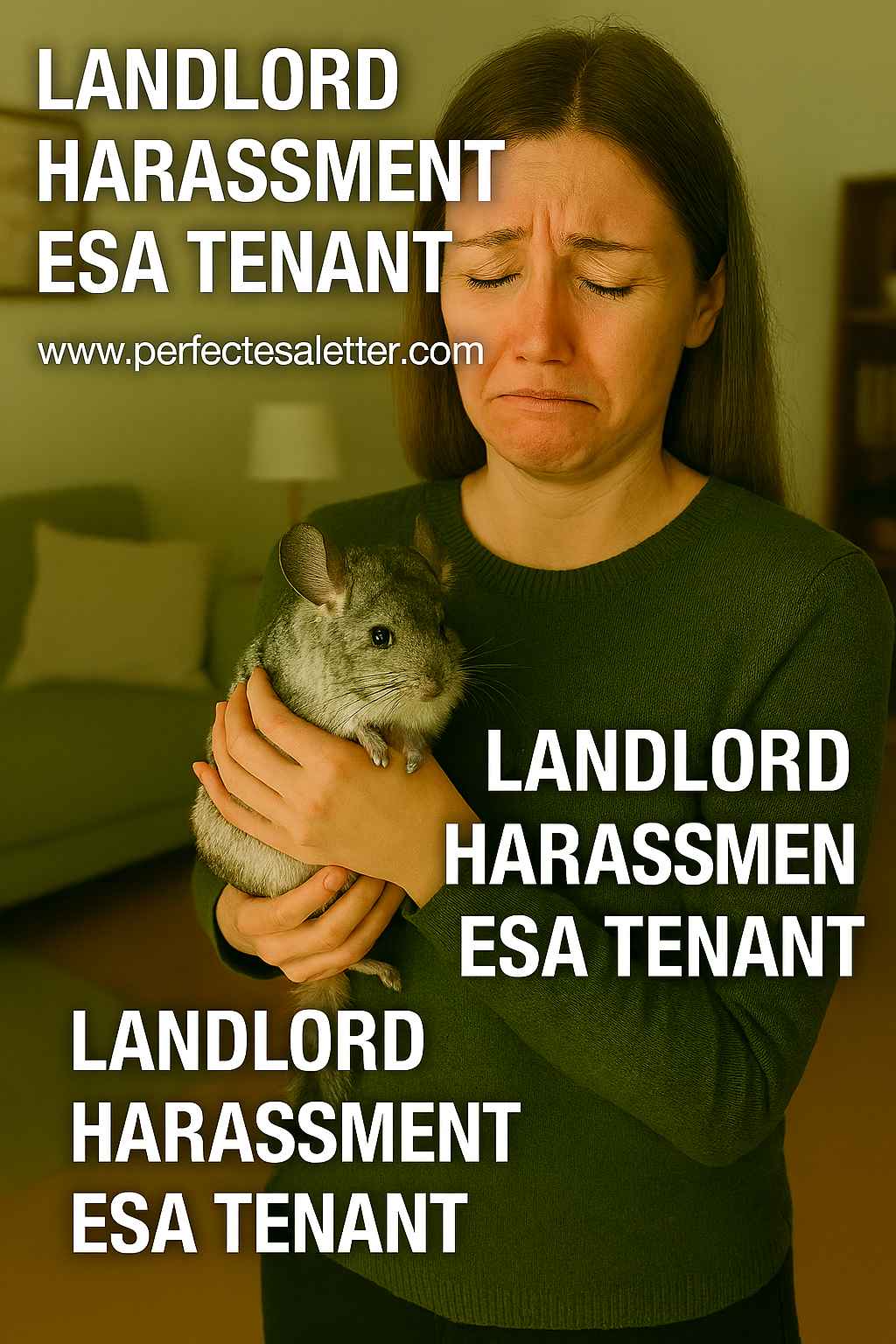Filing a Landlord ESA Lawsuit: Protecting Your Rights
Article
Introduction
Emotional Support Animals (ESAs) are vital for individuals with emotional or mental health conditions. Federal law, particularly the Fair Housing Act (FHA), ensures ESA tenants have the right to reasonable accommodations in housing.
Despite these protections, some landlords may engage in illegal practices such as eviction threats, illegal fees, harassment, or refusal to accommodate ESAs. When all other avenues fail, tenants may consider filing a landlord ESA lawsuit to enforce their rights and protect their emotional support animal.
”Get Yours Now!
Don’t wait until a landlord or airline tells you “no pets allowed.” Protect your rights today.
Please fill out this form and our team wil contact you ASAP.
Complete your assessment in minutes , get approved by a licensed professional, and receive your letter within 24 hours.
Understanding ESA Lawsuits
A landlord ESA lawsuit is legal action taken when a landlord violates federal or state laws protecting ESA tenants. Common reasons include:
- Illegal Eviction or Threats
- Attempting to evict a tenant for having a valid ESA.
- ESA Discrimination
- Denying housing, imposing restrictions, or refusing reasonable accommodation due to an ESA.
- Illegal Fees or Deposits
- Charging pet deposits, pet rent, or extra fees for an ESA.
- Harassment or Retaliation
- Intimidation, frequent inspections, or lease non-renewal in response to ESA requests.
- Violation of Lease or Federal Law
- Failing to comply with ESA accommodation requirements under the FHA.
A successful ESA lawsuit may result in compensation, enforcement of accommodation rights, and cessation of illegal landlord actions.
Steps to File a Landlord ESA Lawsuit
- Verify ESA Documentation
- Ensure your ESA letter is valid, dated, and signed by a licensed mental health professional.
- Document Everything
- Keep emails, texts, letters, and written notes of all incidents with the landlord.
- Attempt Resolution
- Communicate professionally with your landlord, request accommodation, and inform them of ESA protections.
- File a Complaint with HUD
- HUD (U.S. Department of Housing and Urban Development) investigates complaints and may mediate disputes.
- Consult a Tenant Rights Attorney
- An attorney experienced in ESA laws can evaluate the case and file a lawsuit if necessary.
- Prepare Legal Evidence
- Include ESA documentation, communication with the landlord, lease agreements, and records of harassment or illegal fees.
- File the Lawsuit
- Your attorney will file a complaint in court, seeking remedies such as:
- Injunction to prevent further violations
- Compensation for damages or fees
- Enforcement of ESA accommodation rights
Tips for a Successful ESA Lawsuit
- Maintain Accurate Records – Document everything related to ESA interactions with the landlord.
- Use Verified ESA Letters – Strong documentation from licensed professionals is crucial.
- Be Professional in Communication – Calm, factual communication strengthens legal standing.
- Know Your Lease – Understand clauses that might conflict with ESA rights.
- Seek Legal Guidance Early – Consulting an attorney before escalation increases the likelihood of success.
Real-Life Example
David, an ESA tenant with PTSD, faced eviction threats and fines for having his ESA dog. He attempted to resolve the issue with his landlord, but harassment continued.
David submitted a complaint to HUD and hired a tenant rights attorney. A lawsuit was filed, and the court ruled in his favor, ordering the landlord to comply with ESA laws, return illegal fees, and refrain from further retaliation.
This example demonstrates that lawsuits, when properly documented and executed, can effectively protect ESA tenants from illegal landlord actions.
FAQs
Q1: Can I sue a landlord for ESA discrimination?
👉 Yes. Discrimination, harassment, eviction threats, or illegal fees related to your ESA are grounds for a lawsuit.
Q2: Do I need a HUD complaint before filing a lawsuit?
👉 While not required, filing a HUD complaint first can strengthen your case and provide mediation opportunities.
Q3: What can I win in an ESA lawsuit?
👉 Potential outcomes include injunctions, compensation for damages or fees, and enforced ESA accommodation rights.
Q4: How long does an ESA lawsuit take?
👉 Duration varies depending on case complexity and court schedules. HUD mediation or legal negotiations may shorten the timeline.
Q5: Can a lawsuit prevent future retaliation?
👉 Yes. Courts can issue injunctions or orders preventing the landlord from further harassment or illegal actions.
Conclusion
Filing a landlord ESA lawsuit is a powerful tool for tenants whose rights are violated. It ensures your emotional support animal is accommodated, illegal fees are refunded, and harassment or discrimination ceases.
Proper documentation, verified ESA letters, professional communication, and legal guidance are essential for success. By understanding your rights and taking timely action, ESA tenants can protect both their housing and the wellbeing of their emotional support animals.
”Get Yours Now!
Don’t wait until a landlord or airline tells you “no pets allowed.” Protect your rights today.
Please fill out this form and our team wil contact you ASAP.
Complete your assessment in minutes , get approved by a licensed professional, and receive your letter within 24 hours.










